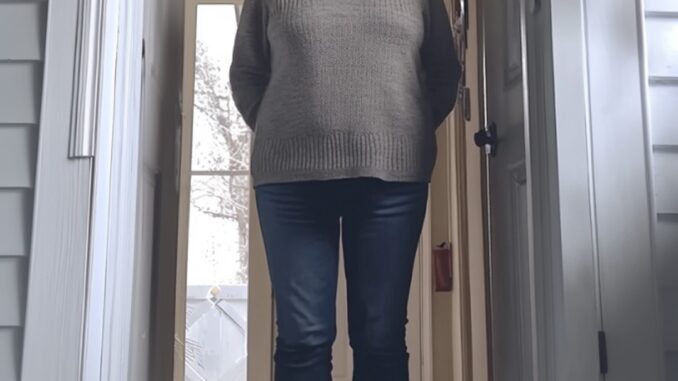
Raised in foster homes all his life, Steve spent years searching for the mother he never knew. When he finally found her, her first words weren’t, “I missed you.” Instead, she said, “I think you’re here for what’s in the basement,” leading him into a chilling confrontation with the past.
For twenty years, I’d wondered what it would feel like to look my mother in the eyes and ask, Why did you leave me? Every foster home, every new beginning, was a stark reminder of the void she left behind. I held onto the fragile belief that she had no choice—that deep down, she had loved me, even if she couldn’t keep me.
Her lullabies haunted me, etched in my memory like a melody meant to soothe but instead slicing through every missed moment: birthdays, Christmas mornings, scraped knees, and tearful nights. I clung to the sound of her voice in my mind, replaying it like a broken record, desperate for proof that I wasn’t just another unwanted child shuffled through the system.
When I turned 18, I began searching. I had no photographs, no full name—just “Marla” and the sound of her voice. I scoured foster care records, hired private investigators, and poured money into databases, but every lead ended in smoke, leaving me with nothing but unanswered questions and a determination that refused to die.
The Breakthrough
A few weeks after my 20th birthday, I got a break. Sharon, a foster parent who had been the closest thing to a real mother I’d ever known, handed me an envelope she’d found in my childhood belongings. Written on the back of an old document was a name and an address in faded ink: Marla.
“This might help,” Sharon said, her voice thick with guilt. “I didn’t think it was my place to share it before. I’m sorry.”
The name felt like a lifeline. My heart raced as I stared at the address, only two hours away. For the first time, I felt like I was standing on the edge of a long-lost connection.
I saved for a new suit—simple but respectable—and bought a bouquet of daisies, unsure if they were her favorite. Then, with a mixture of hope and dread, I drove to the house. Each mile felt heavier than the last, carrying the weight of years of abandonment and fragile expectations.
The Meeting
The house was old and worn, its brown paint peeling, the brass knocker tarnished with age. My legs shook as I knocked. The door opened, revealing a woman with deep wrinkles and silver-threaded hair. But it was her eyes—my eyes—that struck me. They held the same haunted depth, the same sadness.
“Are you Marla?” I asked, my voice trembling.
She stared, her expression unreadable. “I think you’re here for what’s in the basement,” she said.
Her words hit like a hammer. Confused, I hesitated, but she turned and walked down the hall. Against every instinct, I followed.
The house felt heavy, steeped in silence and secrets. The basement door creaked open, releasing a cold, metallic air that sent a shiver down my spine. She descended the stairs, her steps steady, leading me into the shadows of a truth I wasn’t prepared for.
The Basement
At the bottom of the stairs stood an old trunk, its rusted hinges groaning as she opened it. Inside were photographs—hundreds of them. Every single one was of me.
My breath caught. There were pictures from every stage of my life: as a baby, a child, a teenager. School photos, candid shots, moments I didn’t even know had been captured. Someone had been watching me all along.
“I’ve been watching you,” she admitted softly. “I needed to know you were okay.”
Her words were a knife. “Watching me? You abandoned me, left me to rot in foster care, and now you’re telling me you’ve been stalking me?”
Tears welled in her eyes. “I wanted to come for you,” she said. “But your father… he was dangerous. I thought giving you up was the only way to keep you safe.”
The Truth
The words hung heavy in the air. She explained that my father had been violent and controlling, and she’d feared he would hurt me to get to her. By giving me up, she believed she was saving my life.
“Safe?” I spat bitterly. “You left me to bounce between strangers, to feel unwanted and unloved. Do you know how many nights I cried myself to sleep, wondering why you didn’t want me?”
“I wanted you,” she whispered, her voice breaking. “Every day, I wanted you. But I thought you’d have a better life without me.”
Her regret was palpable, etched into every line on her face. “I was wrong,” she admitted. “I’ll never forgive myself for what I did.”
The Aftermath
I sank onto the bottom step, my head in my hands. The emotions were overwhelming—anger, sadness, and a strange, lingering hope. “I don’t know if I can forgive you,” I said finally.
“I don’t expect you to,” she replied, her voice steady despite the tears in her eyes. “I just need you to know that I never stopped loving you.”
We sat in the silence of the basement, surrounded by the weight of our shared history. It wasn’t a resolution, but it was a beginning—a tentative step toward healing wounds that had festered for far too long.
Leave a Reply